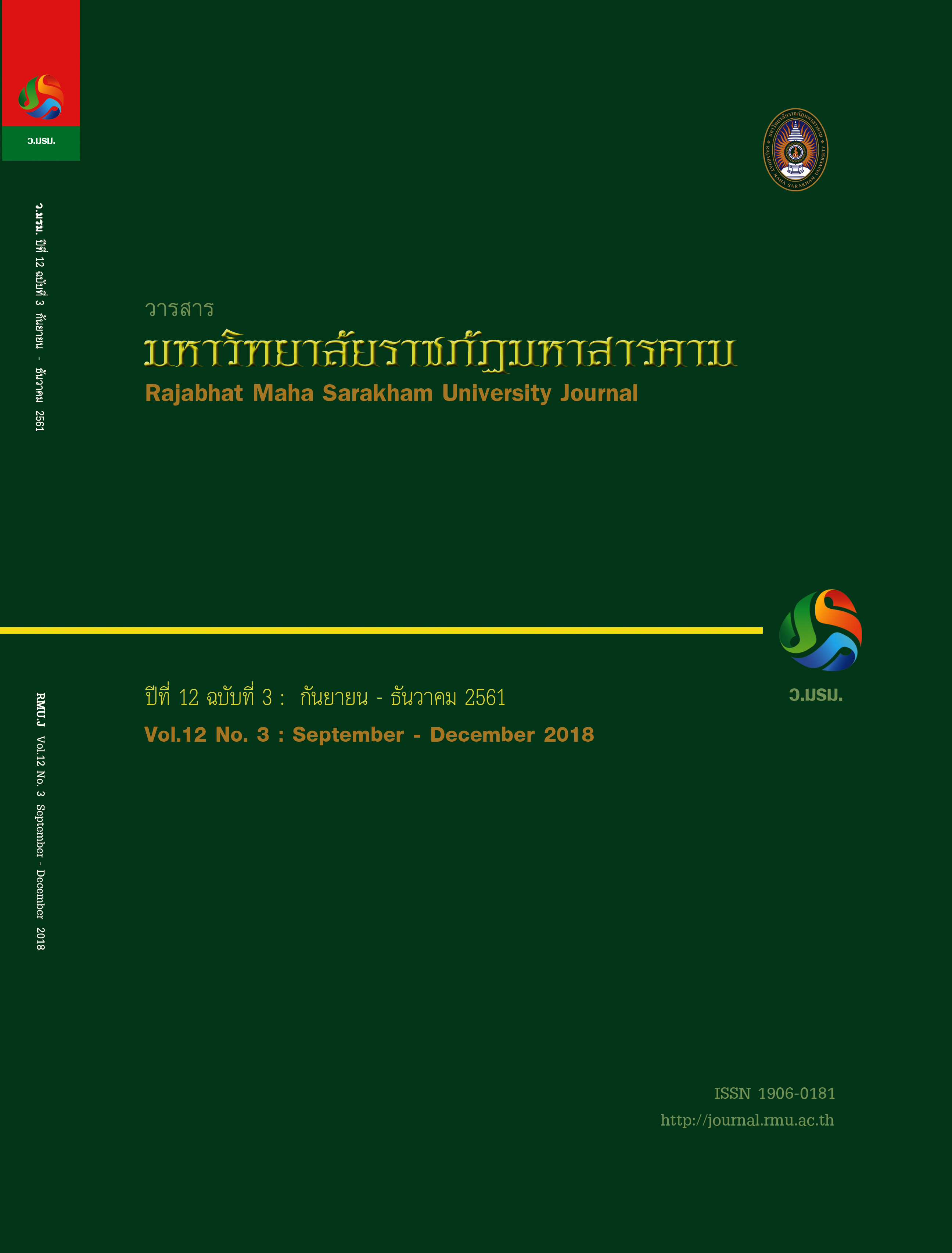รูปแบบการอบรมครูโดยประยุกต์ใช้ไอซีทีที่เหมาะสมในการจัดกิจกรรมการเรียนรู้แบบโครงงาน
Main Article Content
บทคัดย่อ
การวิจัยมีวัตถุประสงค์เพื่อ 1) สังเคราะห์รูปแบบการอบรมครูโดยประยุกต์ใช้ไอซีทีที่เหมาะสมในการจัดกิจกรรมการเรียนรู้
แบบโครงงาน 2) พัฒนาคู่มือการอบรมครูโดยประยุกต์ใช้ไอซีทีที่เหมาะสมในการจัดกิจกรรมการเรียนรู้แบบโครงงาน 3) ศึกษาผลการ
ทดลองใช้คู่มือการอบรมครูโดยประยุกต์ใช้ไอซีทีที่เหมาะสมในการจัดกิจกรรมการเรียนรู้แบบโครงงาน และ 4) ศึกษาผลการประยุกต์ใช้
ไอซีทีที่เหมาะสมในการจัดกิจกรรมการเรียนรู้แบบโครงงานของครูที่เข้ารับการอบรม กลุ่มตัวอย่างที่ใช้ในการวิจัยเป็นครูผู้สอนที่สมัคร
และยืนยันเข้ารับการอบรมหลักสูตรคูปองครู จำนวน 282 คน เครื่องมือที่ใช้ในการวิจัย คือ คู่มือการอบรมครูโดยประยุกต์ใช้ไอซีทีที่
เหมาะสมในการจัดกิจกรรมการเรียนรู้แบบโครงงาน และแบบสอบถามความคิดเห็นของผู้เชี่ยวชาญที่ต่อเครื่องมือการวิจัย และสถิติที่
ใช้ ได้แก่ ความถี่ ร้อยละ ค่าเฉลี่ย และ ส่วนเบี่ยงเบนมาตรฐาน และสถิติทดสอบสมมติฐาน t-test
ผลการวิจัยพบว่า 1) รูปแบบการอบรมครูโดยประยุกต์ใช้ไอซีทีที่เหมาะสมในการจัดกิจกรรมการเรียนรู้แบบโครงงานประกอบ
ด้วย 3 ส่วน คือส่วนที่ 1 นโยบายและหลักการในการอบรมและพัฒนาครู ส่วนที่ 2 กิจกรรมการอบรมครูโดยประยุกต์ใช้ไอซีทีใน
การจัดกิจกรรมการเรียนรู้ ประกอบด้วยการเรียนรู้แบบโครงงาน 4 ขั้น คือ ขั้นนำเสนอ ขั้นวางแผน ขั้นปฏิบัติ และ ขั้นประเมินผล
เป็นกิจกรรมการอบรมครูแบบร่วมมือด้วยกระบวนการ PAOR โดยความร่วมมือของมหาวิทยาลัยราชภัฏมหาสารคาม ครู และโรงเรียน
การประยุกต์ใช้ไอซีทีในการจัดกิจกรรมการเรียนรู้มี 2 วิธี คือ การนำมาเป็นสื่อหลักและสื่อเสริม การเลือกใช้ไอซีทีที่เหมาะสมคือ การที่
ครูผู้สอนเลือกใช้ไอซีทีที่มีอยู่มาใช้ในกิจกรรมการเรียนรู้แบบโครงงานให้เหมาะสมกับบริบทและกลุ่มผู้เรียน และส่วนที่ 3 ตัวชี้วัดของ
รูปแบบการอบรมครู 6 ตัวชี้วัดโดยความคิดเห็นของผู้เชี่ยวชาญที่มีต่อรูปแบบโดยรวมมีความเหมาะสมอยู่ในระดับมากที่สุด 2) คู่มือ
การอบรมครูโดยประยุกต์ใช้ไอซีทีที่เหมาะสมในการจัดกิจกรรมการเรียนรู้แบบโครงงานที่มีผู้ที่เกี่ยวข้องคือ มหาวิทยาลัยราชภัฏ
มหาสารคาม ครูที่เข้ารับการอบรมและโรงเรียนที่ครูสังกัด เนื้อหาสาระการอบรม 6 หน่วย หรือ 6 กิจกรรม คือ (1) เรียนรู้สื่อ
ไอซีที (2) กำหนดเป้าหมาย (3) ออกแบบการเรียนรู้ (4) นำสู่ชั้นเรียน (5) แลกเปลี่ยนเรียนรู้ผ่านสื่อนำเสนอและ (6) บูรณาการความ
คิดสู่แนวปฏิบัติที่ดี ในแต่ละกิจกรรมมีสื่อและเครื่องมือที่ใช้ คือ สื่อนำเสนอ ใบความรู้ และใบกิจกรรม ระยะเวลาอบรม 6 วัน หรือ
36 ชั่วโมง โดยคู่มือการอบรมมีประสิทธิภาพ 87.22/86.89 และความคิดเห็นของผู้เชี่ยวชาญที่ต่อคู่มือการอบรมครูโดยรวมมีความ
เหมาะสมอยู่ในระดับมากที่สุด 3) ผลการทดลองใช้คู่มือการอบรมครูโดยประยุกต์ใช้ไอซีทีที่เหมาะสมในการจัดกิจกรรมการเรียนรู้แบบ
โครงงาน กลุ่มตัวอย่างมีคะแนนเฉลี่ยก่อนอบรมและหลังอบรมแตกต่างกันอย่างมีนัยสำคัญทางสถิติที่ระดับ .01 โดยมีคะแนนเฉลี่ย
หลังอบรมสูงกว่าคะแนนเฉลี่ยก่อนอบรม และผู้ทรงคุณวุฒิเห็นด้วยกับกิจกรรมการเรียนรู้แบบโครงงานของกลุ่มตัวอย่าง อยู่ระหว่าง
ร้อยละ 88.30-99.29 และ 4) กลุ่มตัวอย่างได้ประยุกต์ใช้ไอซีทีที่เหมาะสมในการจัดกิจกรรมการเรียนรู้แบบโครงงานครบทุกคน
โดยเลือกใช้สื่อที่นำเสนอในหลักสูตรอบรมครบทุกคนและทุกรายการในการนำไปใช้เป็นสื่อหลักและสื่อเสริม และกลุ่มตัวอย่างได้หา
สื่อเพิ่มเติมจากการอบรม จำนวน 207 คน คิดเห็นร้อยละ 73.40 โดยจัดหาเพิ่ม 8 รายการ และสื่อที่หาเพิ่มเติมได้มีการนำมาใช้มาก
ที่สุด คือ Kahoot คิดเป็นร้อยละ 69.50
Article Details

อนุญาตภายใต้เงื่อนไข Creative Commons Attribution-NonCommercial-NoDerivatives 4.0 International License.
1. บทความที่ลงตีพิมพ์ทุกเรื่องได้รับการตรวจทางวิชาการโดยผู้ประเมินอิสระ ผู้ทรงคุณวุฒิ (Peer Review) สาขาที่เกี่ยวข้อง อย่างน้อย 3 ท่าน ในรูปแบบ Double blind review
2. ข้อคิดเห็นใด ๆ ของบทความที่ลงตีพิมพ์ในวารสารมหาวิทยาลัยราชภัฏมหาสารคาม นี้เป็นของผู้เขียน คณะผู้จัดทำวารสารไม่จำเป็นต้องเห็นด้วย
3. กองบรรณาธิการวารสารมหาวิทยาลัยราชภัฏมหาสารคาม ไม่สงวนสิทธิ์การคัดลอกแต่ให้อ้างอิงแสดงที่มา
เอกสารอ้างอิง
Ministry of Education. (2008). The Basic Education Core Curriculum B.E. 2550. Bangkok. Agricultural Co-opertive Federation of Thailand.,LTD.
James Bellanca. (2011). 21st century skills : Rethinking how students learn. Solution Tree Press, Ron Brandt, ED.
Trilling, Bernie and Fadel, Charles. (2009). 21st Century Skills : Learning for Life in Our Times.United States of America : John Wiley & Sons.
Reny Dwi Riastuti. (2016). Strategy Project Based Learning (PjBL) Improving Skills of Students in Learning for the 21st Century Learning Media Course. In Proceedings of the 2nd SULE – IC 2016.FKIP : Unsri Palembang, (929-936).
Harris, H. & Katz, G. (2001). Young Investigators : The project approach in the early years. 2nd Edition. New York : Columbia University Press.
Grant, M. (2002). [serial online]. Getting a grip on project-based learning : Theory, cases and recom mendations. Meridian : A Middle School Computer Technologies Journal. [cited 2017 Feb, 21].Available from : http://www.ncsu.edu/meridian/win2002/514.
Muhammad Khair Noordin, Sarimah Ismail, Ahmad Nabil, Mohd Safarin Nordin and Dayana Farzeeha Ali1. (2016).[online]. Framework for Project-based Learning (PjBL) in Providing Real World Experience for Electrical Engineering Students. [cited 2017 Jan, 30]. Available from : https://www. researchgate.net/publication/311737439.
Office of the Education Council, Ministry of Education. (2007). Project-based Learning. Bangkok. Agricultural Co-opertive Federation of Thailand.,LTD.
Bupphachart Tunhikorn. (2012). The Application of Information Technology in Teaching and Learning. Bangkok, Office of Technology for Teaching and Learning.
B. Stphanie. (2010). Project-Based Learning for the 21st Century : Skills for the Future. The Clearing House, Vol. 83, No. 2, 39-43.
Chuleepron Surachote and Montien Chomdokmai. (2015). Development of In-Service Training Curriculum of Project-Based Learning Using ICT Integration for Teachers in Schools under Lopburi Primary Educational Service Area Office II. EAU Heritage Journal 56 Social Science and Humanity. Vol.5,No.3, 56-64.
Lusine Madoyan. (2017). [online]. Authenticity and Teacher’s Role in Project Based Learning.[cited 2017 May, 30]. Available at : http://publications.ysu.am/wp-contentuploads/2017/07/11Lusine-Madoyan.pd ว.มรม. ปีที่ 12 ฉบับที่ 3 : กันยายน - ธันวาคม 2561 353 RMU.J. 12(3) : September - December 2018
Amadu, K. S. (2011). [online]. Project-Based Learning. [cited 2017 March, 2]. Avaliable from : http://www.edutopia.org/ projectlearningintroduction.
Supatcha Srichaoum, Montien Chomdokmai and Ladda Sucpridee. (2014). The Effect of Project-Based Learning Using ICT in Career and Technology for Grade 7 Student of Piboonbumpen Demonstration School Burapha University. Journal of Education and Social Development. Vol.10,No.1,308-318.
Passkorn Ruengrong, Brayat Jiravarapong, Wanlicha Manyum, Wilawan Somyaron, Saranyu Muendet and Chamaiporn Srisurat. (2014). Educational Technology VS Thai Teacher in 21st Century. Panyapiwat Journal, Vol.5 Special Issue May 2014, 195-205.
Faculty Information Technology. (2560). A Report of Teacher’s Training 2560. Rajabhat Mahasara kham University. Mahasarakham.
Best, John. W. Research in Education. 3nd. Ed.,Englewood Cliffs, New Jersey. Prentice-Hell,Inc ;1997.
Monchai Tiantong. (2545). Croseware Desing and Development. Bangkok. King Mongkut’s University of Technology North Bangkok.
Apichat LagdeeSomjet Poosriand Worapapha Arreerard. (2016). The Development of a Volunteer Training Activity with PAOR of eDLTV Learning for Small Schools in the Network of Rajabhat Maha Sarakham University. Technical Education Journal King Mongkut’s University of Technology North Bangkok.Vol.7, No.2, 259-267.
Therdchai Buaphai Warapapha ArreerardTharach Arreerardand Sombat Tayraukham. (2015). A Model of ICT Competency Training for Teachers in Basic Information Technology and Communications. Course primary level in the Basic Core Curriculum of the Basic Education B.E.2551 under the Office of the Basic Education Commission. Technical Education Journal King Mongkut’s University of Technology North Bangkok.Vol.6, No.1, 68-77.
Ratana Butsurin, Surat Duangchathom, Tharach Areerard and Woraprapa Arreerard. (2015). A Model for 1st Grade Teacher Development of Tablet-Based Learning Activity Management through Pair-work Technique. Journal of Rajabhat Mahasarakham,Vol.9 No.2,213-226.


